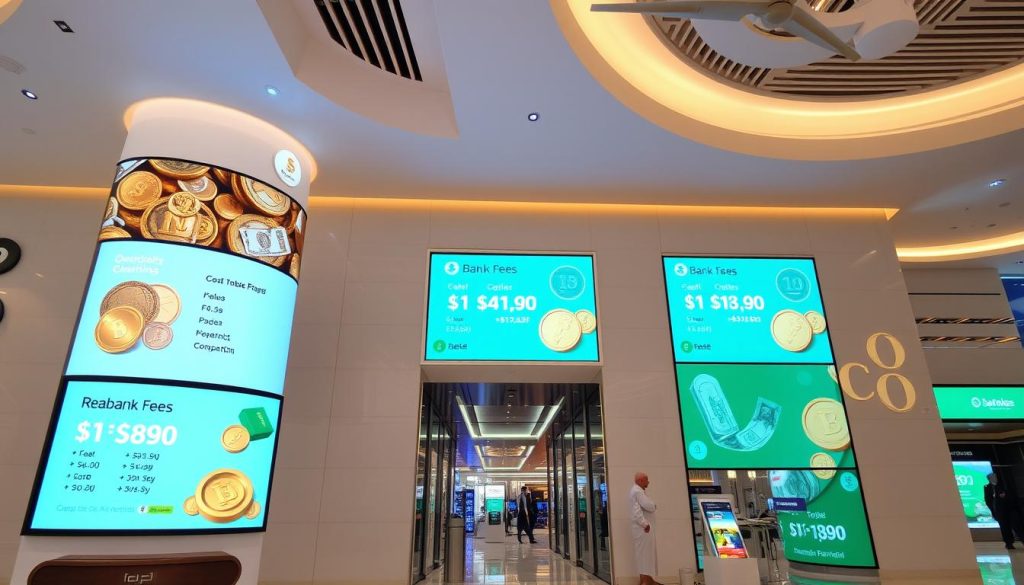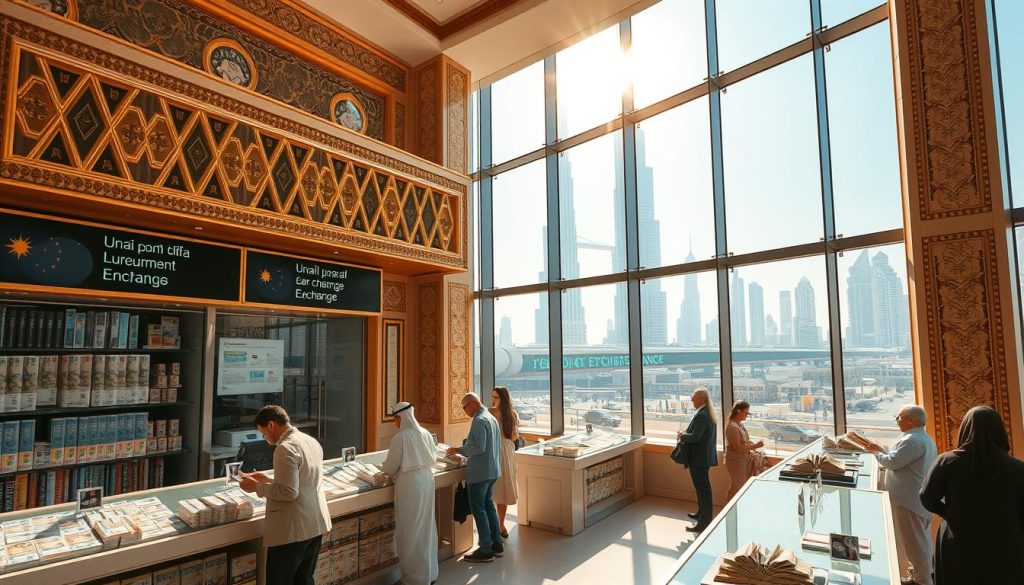In the bustling economic hub of the UAE, knowing about Business Banking in Dubai is key for UK firms. This section answers common questions to help businesses understand Dubai’s banking scene. It covers everything from custom financial services to the rules that apply.
Our goal is to give businesses the knowledge they need to succeed in Dubai. We’ll share practical advice and detailed information. This will help UK firms tackle the challenges of banking in Dubai.
Understanding the Business Banking Landscape in Dubai

The business banking scene in Dubai has grown a lot. This is thanks to Dubai’s key role as a global financial hub. The banking system here offers many services for both local and international businesses. This shows how dynamic and competitive financial services in Dubai are, backed by strong rules.
Local, international banks, and special financial institutions are key players. The Dubai International Financial Centre (DIFC) is a big draw for foreign businesses. It offers a great place to do business, with laws that match global standards.
The UAE Central Bank also plays a big part. It makes sure the financial services are stable and trustworthy. The banking sector’s growth meets the needs of local and international businesses. It’s a smooth place for financial dealings.
Importance of Business Banking for UK Firms

Effective business banking is key for UK firms in Dubai. It offers many benefits that can greatly help their success. Having the right financial tools means companies can invest in growth and manage costs well.
One big business banking benefit is better cash flow management. UK firms in Dubai can work with local banks to create strong financial plans. This helps with cash flow and resource use, making operations smoother and quicker to adapt to market changes.
Getting local insights is also vital for business finance Dubai. Working with banks gives UK businesses valuable info on consumer habits and market trends. This helps with planning and staying competitive in Dubai.
Building strong bank relationships is crucial. It makes operations smoother and reduces risks from currency changes and rules. Successful UK firms in Dubai show how important a good banking strategy is. It helps them deal with market changes and stay competitive.
Types of Business Bank Accounts Available

Setting up business bank accounts in Dubai is key for firms in the area. Each account type has special features and benefits for different business needs. Knowing these helps companies manage their money well and save more.
Savings Accounts for Businesses
Business savings accounts help firms grow their money by earning interest. They often have higher interest rates than current accounts. This makes them great for businesses wanting to increase their capital without losing liquidity. They come with features like:
- Interest payments calculated daily or monthly
- Accessibility to funds without penalties
- Minimum balance requirements that are often lower than fixed deposit accounts
Current Accounts for Daily Operations
Current accounts are vital for daily business needs. They let businesses make transactions freely. This is key for smooth cash flow management, keeping finances stable day-to-day. They offer:
- No withdrawal limits, providing maximum flexibility
- Overdraft facilities to bridge cash flow gaps
- Online banking capabilities for easy management
Fixed Deposit Accounts for Investment
Fixed deposit accounts are for businesses wanting to invest funds for set periods. They usually offer higher interest rates than regular savings accounts. They’re perfect for firms with extra cash that can wait. Benefits include:
- Fixed interest rates providing certainty in returns
- Tenure options that range from a month to several years
- Potential for higher interest rates based on deposit amounts
Key Financial Institutions Offering Business Banking in Dubai

Dubai’s banking sector is strong, with many top banks serving businesses. Emirates NBD is a leading bank, offering financial solutions for companies. They have special loans, treasury services, and advice.
Many businesses choose Emirates NBD for its good service and success.
Abu Dhabi Commercial Bank is another key player. It’s known for its creative business banking. They offer trade finance, cash management, and custom loans.
Companies like this bank for its help in managing money well.
HSBC is also a top bank in Dubai, famous for its global network. It helps businesses with international trade and investments. They have a wide range of products, from loans to treasury services.
Other banks also play a big role in Dubai’s business banking. It’s important for businesses to compare banks. Look at customer service, fees, and products when choosing a bank.
Requirements for Opening a Business Bank Account in Dubai

Foreign businesses need to know the rules for opening a bank account in Dubai. They must gather the right documents first. This makes sure they follow local laws and bank rules.
Opening a business account in Dubai requires specific papers. This makes the process easier for everyone involved.
Documentation Required for Foreign Firms
Foreign firms need to bring certain documents to open a business account in Dubai. These include:
- Trade licence: Proof of legal business operations in Dubai.
- Passports of all business owners: Identification for those with ownership stakes.
- Company registration documents: Evidence of the firm’s establishment and operation.
- Board resolution: Authorising the opening of the account, if applicable.
- Proof of address: Documentation confirming the physical location of the business.
Common Eligibility Criteria
Banks in Dubai also have common rules for foreign businesses. These rules include:
- Minimum deposit requirements: Firms must deposit a specified amount upon opening the account.
- Business activity verification: Confirmation that the business activities align with the trade licence.
- Established business history: Some banks prefer firms with a proven operational track record.
- Local sponsorship: Depending on the business structure, a local sponsor might be required.
Business Banking in Dubai: Fees and Charges

It’s key for UK firms to know about fees and charges in Dubai’s business banking. These costs can greatly affect your business’s expenses. You should understand the fees for keeping your account active and for transactions.
Account Maintenance Fees
Fees for keeping your account can differ a lot between banks in Dubai. These fees might be monthly or yearly. They can include:
- Basic account service fees
- Inactivity fees for dormant accounts
- Fees for extra services, like cheque books or online banking setup
Comparing fees from different banks is vital to find the best deal. Some banks might not charge fees for certain accounts or after reaching certain transaction levels.
Transaction Charges and Limits
Transaction fees can add up for businesses handling everyday money tasks. Common fees include:
- Fees per transaction for local and international transfers
- Charges for deposit transactions, such as cash or cheques
- Foreign exchange fees for converting currencies
Banks also have transaction limits in Dubai. Knowing these limits helps avoid extra fees and keeps your finances running smoothly.
How to Choose the Right Business Bank in Dubai

Choosing the right bank is key for businesses in Dubai. You need to look at service quality, what products they offer, and how clear their prices are. A good plan can help find the best bank for your business.
Factors to Consider
There are important things to think about when picking a bank. These include:
- Service Quality: Check how well the bank supports its customers and how easy it is to get help.
- Product Offerings: See what financial products they have, like loans and investments.
- Pricing Transparency: Find banks that are open about their fees and don’t hide costs.
- Reputation: Look at what other customers say and any awards the bank has won.
Comparing Different Banks
Comparing banks in Dubai can be easier with a plan. Here’s a checklist to help:
- Make a list of banks you’re interested in based on your research.
- Read what other business owners say about their experiences.
- Check the banks’ websites for more info on their products and fees.
- Get in touch with each bank to see how they respond and help.
Accessing Online Banking Services

In today’s fast world, online banking is key for Dubai businesses. It offers many features to boost business banking. Business owners can manage their accounts, transfer money, and pay bills easily.
Digital banking in Dubai is super convenient. It lets business owners check their finances anytime, not just during bank hours. It also has top-notch security, like two-factor authentication and encryption, to keep transactions safe.
- Account management tools for easy tracking of balances and transactions
- Secure fund transfers to various recipients
- Automated bill payments to ensure timely settlements
- Access to comprehensive reporting and analytics for better decision-making
As tech gets better, so does online banking. Dubai businesses can use these updates to improve their finances.
Preparing for a Business Loan Application in Dubai

Getting a business loan in Dubai needs careful planning. It’s important to know the application process and what documents you need. Here are the key documents and interest rates you should know about.
Essential Documents for Loan Application
Having all your documents ready is crucial. You’ll need:
- Financial statements, including profit and loss statements
- Detailed business plans outlining goals and strategies
- Cash flow forecasts to demonstrate financial viability
- Tax returns from previous years for proof of income
- Identification documents for all business partners or shareholders
These documents help lenders understand your business’s financial health. This is key in their assessment.
Understanding Interest Rates and Terms
Interest rates for business loans in Dubai vary. They depend on the lender and the loan type. Rates can be between 4% and 12%, based on your credit score and loan amount. Loan terms usually last from one to five years, giving you flexibility.
Navigating Currency Exchange in Dubai

Dubai is a key place for currency exchange, helping businesses with foreign exchange needs. There are many ways to handle transactions in different currencies. Companies can use banks or visit currency exchange bureaux across the city.
Each option has its own benefits, letting businesses pick what suits them best.
Exchange rates are very important for business deals. Changes in these rates can affect costs and profits. Companies that trade in currencies need to keep an eye on the market.
They should watch and study exchange rates closely. This helps them make smart choices.
Companies can use special tools to reduce currency risks. For example, forward contracts let them set exchange rates for future deals. This helps protect them from market ups and downs.
It’s especially good for companies that buy and sell goods across borders. It keeps their finances stable.
By using what Dubai’s currency market offers, businesses can improve how they work and manage money. Knowing about both banks and bureaux helps them do better in the global market. This makes them more competitive.
Regulatory Environment for Business Banking in Dubai

The rules for business banking in Dubai come from the Central Bank of the UAE and the Financial Services Regulatory Authority. They make sure banks follow the rules, keeping businesses safe and reliable.
For companies in Dubai, following financial rules is crucial. They must stick to strict anti-money laundering (AML) rules and know their customers well. Following these rules helps avoid big fines and keeps the financial system strong.
Businesses also need to know about deposit insurance schemes to protect customer money. Knowing these rules helps avoid risks and keeps finances running smoothly. Working with legal and financial experts can help businesses understand and follow Dubai’s banking rules.
Common Challenges UK Businesses Face in Dubai Banking

UK businesses entering Dubai often face many challenges. These can make banking difficult. Language barriers, different banking customs, and local regulations are big hurdles.
Language Barriers
Language can be a big problem for UK businesses in Dubai. Many banking processes and documents are in Arabic. This makes it hard for those who don’t speak Arabic to understand.
Using bilingual staff or asking banks for help is a good solution. This way, businesses can better navigate these language challenges.
Understanding Local Banking Customs
Knowing Dubai’s banking customs is key for smooth operations. UK businesses might find differences in transaction times, negotiation styles, and document formats.
Working with local financial consultants can help. They know these customs well and can make banking easier for UK businesses.
Future Trends in Business Banking in Dubai
The future of banking in Dubai is changing fast. Fintech is leading the way, bringing new solutions that make banking better. These changes are making banking services more available and pushing traditional banks to be more innovative.
Blockchain technology is also becoming more popular. It helps make transactions safer and more open. This is key for Dubai’s economy, which deals with many countries.
Sustainable banking is another big trend. Banks are now focusing on being green. This meets global standards and what customers want. As these trends grow, Dubai businesses must keep up to stay ahead.

